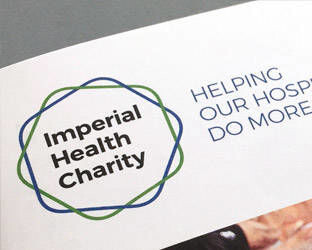Dementia Action Week 2018
Dementia Action Week 2018
21 May 2018

There are around 850,000 people with dementia in the UK and, due to our ageing population, this is expected to rise to 2 million by 2051. Dementia is a condition that encompasses a range of symptoms to do with the decline of the brain. This can include memory loss, difficulties communicating and changes in behaviour. A third of people over 65 will develop dementia and two thirds of people with dementia are women.
Hospitals can be particularly disorientating and frightening places for people with dementia and Imperial Health Charity is proud to be the supporter of several key initiatives aimed at improving the quality of care for them.
Technology to help patients fall less and socialise more
The charity has funded the use of My Improvement Network technology, which provides a plethora of activities that includes games, music, physical exercises and opportunities for social interaction all contained within an All-in-One unit that is portable, compact and compliant with infection control requirements.
The technology has been in use on Valentine Ellis and Albert ward at St Mary’s Hospital since spring 2016 and involves activities on computers, television screens and tablets. It helps patients in a number of ways, including helping to reduce the number of falls and reducing the need for one to one Special Nurses. A study of patient falls on the Albert ward found that after the technology was introduced, falls dropped by 50%.
Katie Pritchard, Ward Manager on Albert ward, said: “The technology has made such a difference. It has transformed the way we deliver our nursing care to patients with dementia; we’ve even won a Quality Improvement Award recently. We would like to thank the charity for providing the funding for this equipment.”
Creative workshops
Since July 2015 Imperial Health Charity has funded weekly creative workshops for elderly patients and those with dementia, organised by Paper Birch, an organisation that uses art and creative workshops to stimulate patients and encourage memories and thoughts.
Paper Birch run the workshops where patients are encouraged to use arts and crafts as a means of expression. “It's wonderful having such fantastic enthusiasm from the staff to make projects like this happen,” said Faith Wray, Paper Birch’s founder.
"Our workshops can make a genuine difference to patients and staff, as it gives ward staff the time to concentrate on patients who are in need of more frequent care. Alongside this, workshops can encourage mobility of patients and can totally change the atmosphere around a ward.”
Specialised support to keep patients well-nourished and hydrated
Many dementia patients find it difficult to eat and drink enough to keep themselves well-nourished and hydrated. To address this, Imperial Health Charity funded an innovative hydration and nutrition pathway to help patients consume the amount they need, which was developed by the dementia care team at Imperial College Healthcare NHS Trust.
The Dementia Nutritional Support in Hospital Pathway (also known as NoSH) has three tiers of care and aims to improve nutrition and hydration in patients with dementia by providing a tailored response to their needs.
All patients who are admitted to the Trust with a diagnosis of dementia are automatically placed on the first tier of the NoSH programme, known as 'core support'. Patients have their weight monitored regularly and their food and fluid intakes recorded to help the nursing team ensure they are getting all they need. Patients are also given healthy snacks providing them with access to nutritious foods on demand and sugar-free squashes to add to water to help keep their fluid levels up.
For patients who require a little more support, the team has developed the 'enhanced' and 'intensive' tiers of the programme, which include daily reviews, one to one support for patients and the use of music during meal, scientifically proven to stimulate appetite.
Nurse Jo James, dementia care lead at the Trust said: "Good nutrition is a vital part of dementia patients' recovery and goes hand-in-hand with treating their medical needs. Our new patient centred approach to nutrition and hydration allows us to keep a close eye on patients' intake while they are on the wards, which aids a speedy recovery so they can return to their own home sooner."
Dementia-friendly wards at St Mary’s Hospital
To help patients with dementia feel safe and secure, the Witherow ward at St Mary’s Hospital was completely redeveloped with funding from Imperial Health Charity in 2016.
Key improvements on the ward include:
- specialist lighting which mimics changes in natural light to help prevent patients from being confused about the time of day by artificial lighting
- a social area where patients can eat their meals together and which is painted orange to help stimulate appetite, as many patients with dementia do not eat enough
- pictures chosen by the patients themselves and hung over their bed to help them find it
- doors painted in contrasting colours to help patients easily find the showers and toilets
- matt wooden flooring, which replaces the old shiny blue coloured flooring that could be confused by some elderly patients as water
- clocks from the Alzheimer’s Society that tell the time and date, which are known to help orientate patients with dementia.
The charity also contributed £320,000 towards a £1 million refurbishment of the 20-bed Thistlethwayte ward to create extra space for beds and bathrooms, with dementia-friendly signs, special lighting and artwork installed to help frail patients feel more comfortable during their time in hospital.
Ian Lush, chief executive of Imperial Health Charity, said: “We are delighted to have supported this essential refurbishment, which will ensure the staff on the Thistlethwayte ward can continue to provide outstanding care for elderly patients when they need it most.
“The team of nurses here work incredibly hard day after day, night after night, to help patients with complex conditions – including many who have dementia – and this fantastic new ward will equip them with the best possible tools for the job.”
Helping staff better understand dementia
To help raise awareness of the condition across the trust, the charity has paid for the recruitment of somebody with first-hand experience. Dianne Campbell was diagnosed with vascular dementia at the age of 47 and wants to use her diagnosis to help others. She’s been brought on board to host training sessions, providing a unique insight for healthcare staff.
The Learning From Life project has had a transformative effect on staff and many have told us that their perceptions of people with dementia have changed entirely.
At the same time, the platform has given a voice to dementia patients, putting them at the heart of the Trust’s efforts to make hospitals more welcoming for people living with the condition.
Our funding has covered the cost of Dianne’s part-time salary, providing staff training one day a week and supporting the dementia team with a range of other tasks.
For more information about dementia, please visit http://www.nhs.uk/Conditions/dementia-guide/Pages/about-dementia.aspx

